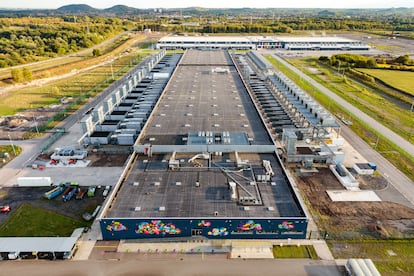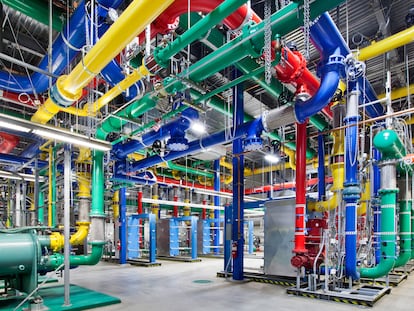Data centers, AI and cryptocurrencies will double electricity demand by 2026
The strong rise contrasts with the sluggish overall consumption, according to the IEA, which forecasts that renewables will overtake coal next year


Two major transformations are going down parallel paths: digitalization and renewables. Data centers, artificial intelligence (AI) and cryptocurrencies will double their electricity consumption by 2026, according to the latest forecasts from the International Energy Agency (IEA). By next year, the organization also expects that renewable energy generation will surpass that of coal, the most polluting fuel and one of the main causes of global climate change. This would make it the largest global source of electricity.
The OECD’s energy arm points out that data centers are a “significant” driver of electricity demand “in many regions.” Data centers consumed 460 terawatt hours (TWh) in 2022, the last year for which there are figures, and this number is expected to exceed 1,000 TWh in 2026. In other words, data centers will go from requiring the same amount of energy as France to requiring the same amount as Japan, the world’s fifth-largest power. “Updated regulations and technological improvements, including on efficiency, will be crucial to moderate the surge in energy consumption from data center,” the Paris-based agency said in its Electricity 2024 report on Wednesday.
At the end of 2023, there were just over 8,000 data centers around the world. A third of them were in the United States, 16% in Europe and around 10% in China. Spain was a popular spot in Europe, due to its lower electricity costs, but today most are located in financial hubs such as Frankfurt, London, Amsterdam, Paris and Dublin.
The sharp increase in energy demand from data centers, AI and cryptocurrencies contrasts with a much more sluggish growth in overall demand, despite the push from India, China and several Southeast Asian countries. The 2.4% increase recorded in 2022 was followed by a rise of 2.2% in 2023. In both years, advanced economies — particularly in Europe — have significantly reduced demand due to the energy crisis and lower industrial production.
Electrification and green boom
Over the next three years, the IEA projects that global electricity demand will rise an average of 3.4% annually. “The gains will be driven by an improving economic outlook, which will contribute to faster electricity demand growth both in advanced and emerging economies,” the report stated. “Particularly in advanced economies and China, electricity demand will be supported by the ongoing electrification of the residential and transport sectors, as well as a notable expansion of the data center sector.”
The share of electricity in final energy consumption is estimated to have reached 20% in 2023. This is two percent more than in 2015, but still far from the 30% target set by the IEA for 2030 as part of its goal to achieve net zero emissions — a pathway aligned with limiting global warming to 1.5°C.
Much more evident will be the acceleration in renewables. Emission-free energy sources (solar, wind, hydro and nuclear) are forecast to go from providing 40% of the electricity consumed in the world in 2023 to around 50% in 2026. Nuclear energy will continue to rise, setting an all-time record next year, “as French output continues to recover from lows in 2022, several plants in Japan come back online and new reactors begin operations in markets including China, India, Korea and Europe.”
But the differentiating factor will be green sources, which by early next year will overtake coal as the main source of electricity worldwide, pushing the share of fossil fuels (coal, gas and oil) below 60% for the first time since records began.
Sign up for our weekly newsletter to get more English-language news coverage from EL PAÍS USA Edition









































